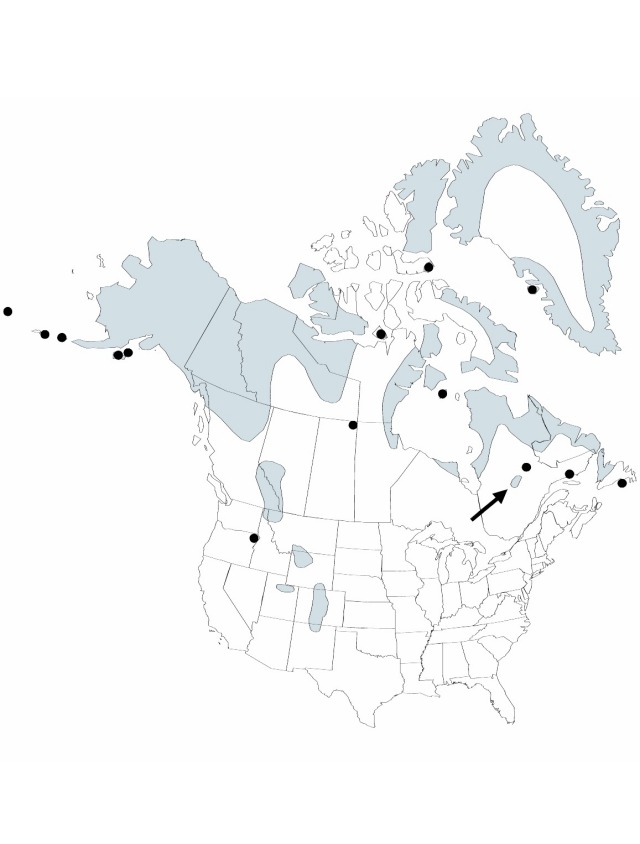Difference between revisions of "Juncus triglumis"
Sp. Pl. 1: 328. 1753.
FNA>Volume Importer |
RevisionBot (talk | contribs) m (Bot: Adding category Revised Since Print) |
||
| (5 intermediate revisions by 3 users not shown) | |||
| Line 19: | Line 19: | ||
-->{{Treatment/Body | -->{{Treatment/Body | ||
| − | |distribution= | + | |distribution=Alta.;B.C.;Man.;N.W.T.;Nunavut;Ont.;Que.;Sask.;Yukon;Alaska;Colo.;Idaho;Mont.;N.Mex.;Oreg.;Utah;Wyo.;Eurasia. |
|discussion=<p>Varieties 3 (2 in the flora).</p> | |discussion=<p>Varieties 3 (2 in the flora).</p> | ||
|tables= | |tables= | ||
| Line 43: | Line 43: | ||
-->{{#Taxon: | -->{{#Taxon: | ||
name=Juncus triglumis | name=Juncus triglumis | ||
| − | |||
|authority=Linnaeus | |authority=Linnaeus | ||
|rank=species | |rank=species | ||
| Line 50: | Line 49: | ||
|basionyms= | |basionyms= | ||
|family=Juncaceae | |family=Juncaceae | ||
| − | |distribution= | + | |distribution=Alta.;B.C.;Man.;N.W.T.;Nunavut;Ont.;Que.;Sask.;Yukon;Alaska;Colo.;Idaho;Mont.;N.Mex.;Oreg.;Utah;Wyo.;Eurasia. |
|reference=None | |reference=None | ||
|publication title=Sp. Pl. | |publication title=Sp. Pl. | ||
|publication year=1753 | |publication year=1753 | ||
|special status= | |special status= | ||
| − | |source xml=https:// | + | |source xml=https://bitbucket.org/aafc-mbb/fna-data-curation/src/2e0870ddd59836b60bcf96646a41e87ea5a5943a/coarse_grained_fna_xml/V22/V22_458.xml |
|genus=Juncus | |genus=Juncus | ||
|subgenus=Juncus subg. Alpini | |subgenus=Juncus subg. Alpini | ||
| Line 61: | Line 60: | ||
}}<!-- | }}<!-- | ||
| − | -->[[Category:Treatment]][[Category:Juncus subg. Alpini]] | + | --> |
| + | |||
| + | [[Category:Treatment]] | ||
| + | [[Category:Juncus subg. Alpini]] | ||
| + | [[Category:Revised Since Print]] | ||
Latest revision as of 18:34, 6 November 2020
Herbs, perennial, cespitose, 0.3–3.5 dm. Culms 1–8, 0.3–0.5 mm diam. Cataphylls 1–2. Leaves basal, 2–4; auricles slightly prolonged, rounded, scarious to ± leathery; blade deeply channeled, 2–10 cm, mostly shorter than culms. Inflorescences solitary heads, each with 2–3(–50) flowers; primary bracts brownish, nearly equal to or slightly shorter thanabout equaling inflorescence. Flowers: tepals pale brown or darker, oblong-lanceolate, 3–5 mm, outer and inner series nearly equal; stamens 6, filaments 2.5–4 mm, anthers 0.6–1 mm; styles 0.5–0.8 mm. Capsules tan, pseudo-3-locular, 3-gonous–cylindric, apex obtuse, mucronate. Seeds tan or darker, fusiform, body 0.5–1 mm, tails 0.6–1 mm.
Distribution

Alta., B.C., Man., N.W.T., Nunavut, Ont., Que., Sask., Yukon, Alaska, Colo., Idaho, Mont., N.Mex., Oreg., Utah, Wyo., Eurasia.
Discussion
Varieties 3 (2 in the flora).
Selected References
None.
Key
| 1 | Most proximal bracts of inflorescence obtuse to mucronate, usually much shorter than inflorescence; capsules well exserted from perianth, 4.5–7 mm, apex conic or rounded proximal to persistent style | Juncus triglumis var. triglumis |
| 1 | Most proximal bracts of infloresecence equal to or longer than inflorescence, apex long acuminate or awned; capsules included or barely exserted from perianth, 3–5 mm, apex nearly truncate proximal to persistent style | Juncus triglumis var. albescens |